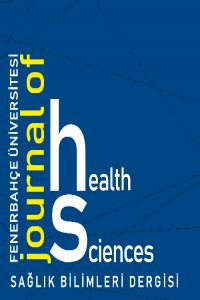Ebelik Öğrencilerinin Ailelerinde Duydukları Doğum Öyküleri Meslek Seçimlerini ve Mesleki Aidiyetlerini Etkiler Mi? Kesitsel Bir Çalışma
Do the Birth Stories That Midwifery Students Hear in Their Families Affect Their Profession Choices and Profession Belonging? A Cross-Sectional Study
Belonging, Midwifery, profession, student, dystocia,
___
- Baskaya, Y., Sayıner, F. D., & Filiz, Z. (2020). How much do I belong to my profession? A scale development study: Midwifery Belonging Scale. Health care for women international, 41(8), 883–898.
- Bass, J., Sidebotham, M., Gamble, J., & Fenwick, J. (2015). Commencing student midwife beliefs about birth and the role of the midwife. International Journal Birth, 5(2), 83–90.
- Bilgiç, F. Ş. (2022). Ebelerin mesleki aidiyetlerinin incelenmesi: Kesitsel bir çalışma. İzmir Katip Çelebi Üniversitesi Sağlık Bilimleri Fakültesi Dergisi, 7 (1), 69-75.
- Carolan, M. (2013). ‘A good midwife stands out’: 3rd year midwifery students’ views. Midwifery, 29(2),115–21.
- Carolan, M., & Kruger, G. (2011). Undertaking midwifery studies: commencing students’ views. Midwifery, 27(5),642–7. Carolan, M., Kruger, G., & Brown, V. (2007). Out of the ashes: the new bachelor of midwifery curriculum at Victoria University. Women Birth, 20(3),127–30.
- Cummins, A., Catling, C., Hogan, R., & Homer, C. (2014). Addressing culture shock in first year midwifery students: maximising the initial clinical experience. Women Birth, 27(4),271–5.
- DeJoy, S. B. (2010). ‘‘Midwives are nice, but . . .’’: perceptions of midwifery and birth in an undergraduate class. Journal Midwifery Women’s Health, 55(2),117–23.
- Doğan, Y.Ö., Orhan, İ., Yıldız, H. E., & Yılmaz, A., N. (2020). Determination of Compassion Levels of Students of the Department of Midwifery. Journal of İnönü University Vocational School of Health Services, 8(3), 566-577. Fraser, D. M., & Hughes, A. J. (2009). Perceptions of motherhood: the effect of experience and knowledge on midwifery students. Midwifery, 25(3), 307–16.
- Green, S., & Baird, K. (2009). An exploratory, comparative study investigating attrition and retention of student midwives. Midwifery, 25(1), 79–87.
- Hughes, A. J., & Fraser, D. M. (2011). ‘‘There are guiding hands and there are controlling hands’’: student midwives experience of mentorship in the UK. Midwifery, 27(4), 477–83.
- Lothian, J. A., & Grauer, A. (2012). Giving birth: ‘‘we just don’t talk about it’’. Journal Perinatalogy Education, 21(2), 123–6.
- McCall, L., Wray, N., & McKenna, L. (2009). Influence of clinical placement on undergraduate midwifery students’ career intentions. Midwifery, 25(4), 403–10.
- McIntosh, A. E., Gidman, J., & McLaughlin, A. (2013). Students’ and lecturers’ perceptions of support in a UK pre-registration midwifery program. Nurse Education Practice, 13(6),578–83.
- Minichiello, V., Aroni, R., Hays, T. (2008). Depth interviewing: principles, techniques, analysis (3rd ed.). Frenchs Forest: Pearson Education Australia.
- Neergaard, M. A., Olesen, F., Andersen, R.S., & Sondergaard, J. (2009). Qualitative description the poor cousin of health research? BMC Med Res Methodol, 9(1), 52.
- Newick, L., Vares, T., Dixon, L., Johnston, J., & Guilliland, K. A. (2013). Midwife who knows me:women tertiary students’ perceptions of midwifery. NZCOM J, 47,5–9.
- Ocak, A. S., Kızılkaya, T., Çelik, M. & Yılmaz, T. (2021). Ebelik bölümü son sınıf öğrencilerinin mesleki aidiyet düzeyleri ve etkileyen faktörler: Kesitsel bir çalışma. Ebelik ve Sağlık Bilimleri Dergisi, 4 (1), 23-33.
- Sandall, J. (2012). Every woman needs a midwife, and some women need a doctor too. Birth-Issues Perinat Care, 39(4), 323–6.
- Sandall, J., Soltani, H., Gates, S., Shennan, A. & Devane, D. (2013). Midwife-led continuity models versus other models of care for childbearing women. Cochrane Database of Systematic Reviews, 8. Art. No.: CD004667.
- Sidebotham, M., & Ahern, K. (2011). Finding a way: the experiences of UK educated midwives finding their place in the midwifery workforce in Australia. Midwifery, 27(3), 316–23.
- Sidebotham, M., Fenwick, J., Carter, A., & Gamble, A. (2015). Using the Five Senses Framework to understand the experiences of midwifery students enrolled in an undergraduate degree program. Midwifery, 31(1), 201–7.
- Strauss, A., & Corbin, J. (1994). Grounded Theory Methodology: An Overview. In N. K. Denzin, & Y. S. Lincoln (Eds.), Handbook of Qualitative Research (Charpter 17, pp. 273-285). Thousand Oaks, CA: SAGE.
- Turan, İ., Unver H. (2021). The Effect of Professional Belonging on Compassion Fatigue and Quality of Life in Midwives. The Eurasia Proceedings of Health, Environment and Life Sciences, 3, 17-22
- Whitehead, D. & Schneider, Z. (2013). Mixed-methods research. In Z. Schneider, D. Whitehead, G. LoBiondo-Wood & J. Haber (Eds.), Nursing & midwifery research: Methods and appraisal for evidence-based practice (4th ed., pp. 263-284). Elsevier - Mosby, Marrickville, Sydney.
- Williams, J. (2006). Why women choose midwifery: a narrative analysis of motivations and understandings in a group of first year student midwives. Evid Based Midwifery, 4(2),46–52.
- Yayın Aralığı: Yılda 3 Sayı
- Başlangıç: 2021
- Yayıncı: Fenerbahçe Üniversitesi
Pediatri Hemşirelerinin Çalışma Ortamı ve İş Yaşam Kalitesi Arasındaki İlişkinin İncelenmesi
Duygu KARAARSLAN, H Yağmur SEVİNÇ, Dilek ERGİN, Özgül BALCI
Pandemide Çocukların ve Ebeveynlerin Hayatını Etkileyen Faktörler: Neler? Nasıl Etkiledi?
Lise Öğrencilerinin Cinsel Yolla Bulaşan Hastalıklar ile İlgili Bilgi Düzeylerinin İncelenmesi
Nazan BÜKÜLMEZ, Tülay KAVLAK, Mustafa KILAVUZ
Elif BÜLBÜL, Selda ÇELİK, Emine Ezgi ÖZÇELİK, Sema YILDIRIM
Kadınların Annelik Algısına Yönelik Bir Metafor Analizi
Ayşe İrem GÖKÇEK, Nur Elçin BOYACIOĞLU
Düşük Yapan Kadınların Algıladıkları Stres İle Eş Desteği Arasındaki İlişki
Emel ÖNGAY, Kerime Derya BEYDAĞ
Üniversite Öğrencilerinde Mobil Bağımlılık Düzeyi ve Problem Çözme Becerisinin İncelenmesi
